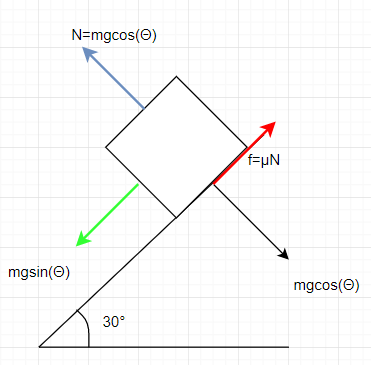A 4.25 kg block is projected at 5.40 m/s up a plane that is inclined at 30.0° with the horizontal. The block slides some distance up the incline, stops turns around and slides back down to the bottom. When it reaches the bottom of the incline again, it is traveling with a speed of 3.80 m/s. If the coefficient of kinetic friction between the block and the plane is 0.500, how far up the incline did the block slide?
A 4.25 kg block is projected at 5.40 m/s up a plane that is inclined at 30.0° with the horizontal. The block slides some distance up the incline, stops turns around and slides back down to the bottom. When it reaches the bottom of the incline again, it is traveling with a speed of 3.80 m/s. If the coefficient of kinetic friction between the block and the plane is 0.500, how far up the incline did the block slide?
Given data
Ideally since gravity is a conservative force, if the friction were absent then the velocity of the return should have been 5.4 m/s (the velocity with which it was projected), but since the friction is present, it does work against component of gravity down the plane, and is proportional to the normal force the plane exerts on the block. From the work energy theorem the change in kinetic energy of the system id equal to the work done by frictional force.
Consider the situation where the block climbs distance l along the incline, so that the total trip back to original position is 2l.

Trending now
This is a popular solution!
Step by step
Solved in 5 steps with 1 images
